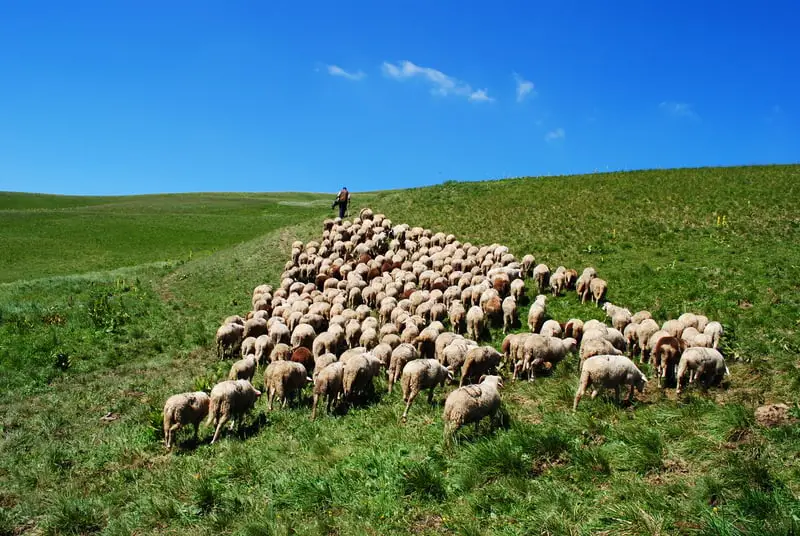The vegan lifestyle has become increasingly popular, and vegan products are easier than ever to find. The reasons behind this trend are varied and include appeals to health concerns, climate concerns, and the proper treatment of animals.
So how should Christians respond to this trend? Should Christians embrace or reject veganism, or is the choice a matter of personal preference?
Christians may choose to adopt vegan diets and lifestyles. Christians are neither required to consume meat nor prohibited from doing so. For each individual Christian, the choice is a matter of conscience and health.
What is Veganism?

According to The Vegan Society, veganism is defined as:
The dietary objective of veganism is to rely wholly on plant-based foods. While a vegetarian may avoid meat, but use other animal products (particularly dairy) which are harvested without slaughtering animals, a vegan refrains from consuming all food derived from animals, or produced by animals (such as honey). 1
Growing Popularity
In the early part of the 21st century, veganism was still establishing its own identity as it distinguished itself from vegetarianism. But by the early 2020s, veganism had gained considerable mainstream momentum and acceptance. And now, whole product lines in grocery stores and even fast-food restaurants make the vegan lifestyle more accessible than ever.
The primary objective of veganism is the same as it had always been: avoiding the exploitation, mistreatment, and killing of animals for human benefit. But the movement has found some helpful allies which have hastened its increasing adoption as a lifestyle, particularly in the West.
Climate-conscious organizations and individuals cite the damaging effects of industrial farming as a reason to embrace veganism. Others cite health concerns such as heart disease, obesity, and resistance to antibodies as reasons to eliminate meat from our diets. And some vegans propose that the feed supplied to animals could instead be used to address food insecurity throughout the world.
It is outside of the scope of this article to examine the merits and veracity of each of these claims. But for the purpose of today’s writing, we at least acknowledge that the intent of each of these ideals is well-meaning, and is promoted with sincerity by its adherents.
The Appeal to Christians
History has shown us that as social and moral causes are embraced in society, they inevitably result in a push for Christians to incorporate these causes into our beliefs and practices. And veganism is no exception.
But as Christians, whenever we weigh appeals to morality, particularly those that originate from outside of a Biblical worldview, we must weigh them against our unchanging moral barometer. The character and commands of God, as revealed in the Word of God, are our authority and standard for what behaviors and actions are acceptable and pleasing to God.
By contrast, the moral values of human society are shown throughout history to be in a state of constant flux, with each generation and each culture determining its own mores and priorities. And it is with this caveat that we examine, through a Biblical worldview, the appeal to Christians to embrace veganism as put forth by PETA. 2
The Case for Christian Veganism
In four of the seven reasons cited by the author, he provides a one-to-two verse passage, usually without commentary, in support of his position. However, in each of these cases, verses are supplied without additional necessary context, which we will now examine.
Biblical Appeals
The author begins by quoting Genesis 1:29-30, which reveals that God’s original design for creation incorporated a vegan food chain. And while this is Biblically accurate, the author fails to acknowledge that after the fall of man and the great flood, God expressly permitted meat consumption (Genesis 9:3).
Later, he interprets Jesus’ illustration of a hen gathering her chicks (Matthew 23:37) as proof that animals do not wish to be eaten. This is eisegesis (reading something in scripture that is not there) that puts words in Jesus’ mouth that are quite different from the words that he actually said. Jesus was not commenting on biological survival instincts but was lamenting how his people have turned away, and expressing his desire to gather them to safety.
The author further challenges that eating meat is akin to consuming our fellow worshippers, by observing that all creatures (even those under the sea) are praising and worshiping Jesus (the Lamb) in Revelation 5:13-14.
This vision of heaven’s throne room does indeed reveal that all of creation is intended to glorify the Creator. However, to suggest that animals, in our present physical reality are capable of worship fails to acknowledge that Jesus calls us to worship in spirit and in truth (John 4:24, emphasis added). Animals, not being made in the image of God, are not spiritual creatures.
Finally, the author invokes Jesus’ instructions to care ‘for the least of these brothers and sisters of mine,’ (Matthew 25:40) as a command to show compassion and mercy to animals. However, a plain reading of the passage (Matthew 25:31-46) reveals that Jesus is addressing our treatment of other people, particularly people in need. To insert animals into this instruction is another example of eisegesis.
Social Concerns
The author rounds out his appeal to veganism by highlighting some social concerns. Specifically, he suggests that eating meat contributes to climate change, that modern farming hinders animals’ self-expression, and that meat consumption contributes to human starvation by making inefficient use of feed grains.
Each of these arguments has its supporters and detractors. On the whole, Christians recognize that caring for our environment and feeding the hungry are both proper and morally right objectives. However, how meat consumption (or any other action) contributes to either of these problems is a much-debated topic that we do not have the space to examine here.
Of the seven points set forth, perhaps the author’s most convincing argument is his challenge to modern farming practices. Indeed, commercial farming is frequently cited by vegans as a cruel and inefficient process that produces, at best, an inferior product compared to more traditional farms. And while it may be morally sound to reject certain abusive farming practices, this is not equivalent to rejecting meat farming and consumption as a whole.
Meat Consumption in the Bible

As previously noted, God specifically permits the consumption of meat in Genesis 9. Later, God describes the Promised Land to Moses as ‘a land flowing with milk and honey,’ (Exodus 3:8), and provided quail for the Israelites to eat in the wilderness (Exodus 16:11).
In the parable of the Prodigal Son, the father calls for a celebration feast, with the fatted calf as the main course (Luke 15:23). And in addition to calling at least four fishermen to be his disciples, Jesus himself was known to feed people with fish (John 6:1-15, 21:12-13).
Yet, even as meat consumption abounds in both the Old and New Testaments, there are still cautionary passages that are sometimes cited in defense of veganism.
Daniel
In the 2010s, a short-term diet called the Daniel Fast gained prominence in some Christian circles. The Daniel Fast is meant to last only a short time (up to 21 days) and consists of raw vegetables, devoid of sugars, caffeine, alcohol, and of course meat.
This fast is extrapolated from Daniel 1, which describes the arrival of Daniel and his fellow Israelites in Babylon upon their exile. Daniel and his companions were offered a portion of the ‘royal food’ from the king’s table but instead chose to eat only raw vegetables and drink only water for a period of 10 days. After the 10 days, they were visibly healthier than those who ate the king’s food, so the guards changed the diets of the other exiles as well.
We don’t know what particular food items were present at the king’s table, so we must be cautious about reading veganism into this passage. We only know that Daniel asked not to defile himself (v 1:8) with the king’s food. From this, we infer that the food consisted either of unclean animals or of food that was sacrificed to a false god, or both. A similar choice can be found in the New Testament as well.
Paul
In 1 Corinthians 8:13, Paul expresses a commitment to never eat meat again. But again, the context of the chapter points us not to veganism, but to separation from idolatrous practices. Paul fully acknowledges at the beginning of the chapter that all things come from God and that all food is, therefore, eligible to be consumed (vs 8:4-6).
But Paul ministered in a predominantly Roman/pagan region, where the only meat that was readily available was from animals that had been sacrificed to pagan gods. Like Daniel, Paul determines that this is a reason to weigh his consumption choices. But unlike Daniel, Paul does not determine that he must turn down this meat for his own sake (he has already stated his freedom in Christ to consume it).
Rather, Paul chooses to abstain from meat for the sake of his witness. In order to help new converts establish their new identity in Christ, he chooses to set an example for them. By distancing his diet from pagan sacrifices, he exemplifies turning from idolatrous ways and embracing Christ.
Freedom of Conscience
For both Daniel and Paul, abstaining from meat was a choice of conscience. And it is for us today, too. While we are neither prohibited from eating meat, nor required to do so, God gives us the freedom to make this determination for ourselves.
The Bible reveals well-reasoned choices based on individual health, the source of our meat, the preparation practices, and the impact on our neighbors. How you weigh each of these factors will depend on your own health as well as the food that is available to you and your understanding of related socio-economic matters.
So whether you eat or drink or whatever you do, do it all for the glory of God. (1 Corinthians 10:31)
References
1. The Definition of Veganism. Posted on vegansociety.com, accessed January 18, 20222.
2. Why Christians should go Vegan for Lent. Posted on peta.org.uk, accessed January 18, 2022





